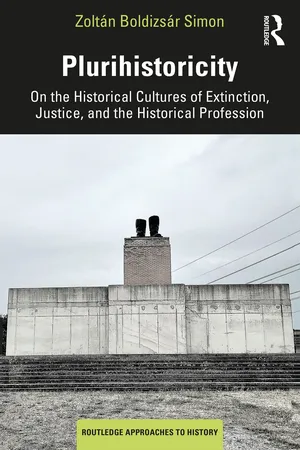
Plurihistoricity
On the Historical Cultures of Extinction, Justice, and the Historical Profession
- English
- ePUB (mobile friendly)
- Available on iOS & Android
Plurihistoricity
On the Historical Cultures of Extinction, Justice, and the Historical Profession
About this book
This book situates historical scholarship within a plurihistoricity of contemporary historical culture, exploring conflicting conceptions of historical change in technological utopias of human enhancement, in prospects of human extinction, in societal responses to the Anthropocene, and in the imperative of bringing colonial patterns of historical injustice to justice.
Contemporary societies increasingly reclaim history from the academic pursuit of historiography. On the one hand, societal engagement in history is growing palpably. History is literally everywhere: in the fallen statues of past political regimes, in trajectories of environmental degradation, and in technological prospects of space expansion. On the other hand, societal demand for history seems to diminish rather than strengthen the authority of professionalized historical studies. What do these societal historicities stand for? How do they create pasts that matter? What futures do they desire or attempt to avoid? How do they view the historical transitions into those futures? And what is the societal role of historical scholarship and scholarly conceptions of history in the plurihistoricity of contemporary historical culture?
By addressing these questions, Simon's book is essential reading for everyone interested in the present and future of viewing the world historically.
Frequently asked questions
- Essential is ideal for learners and professionals who enjoy exploring a wide range of subjects. Access the Essential Library with 800,000+ trusted titles and best-sellers across business, personal growth, and the humanities. Includes unlimited reading time and Standard Read Aloud voice.
- Complete: Perfect for advanced learners and researchers needing full, unrestricted access. Unlock 1.4M+ books across hundreds of subjects, including academic and specialized titles. The Complete Plan also includes advanced features like Premium Read Aloud and Research Assistant.
Please note we cannot support devices running on iOS 13 and Android 7 or earlier. Learn more about using the app.
Information
Table of contents
- Cover Page
- Half Title page
- Series Page
- Title Page
- Copyright Page
- Contents
- Acknowledgments
- On Plurihistoricity: An Introduction
- Part I Transitioning to Futures
- Part II Creating Pasts
- Part III Inhabiting Presents
- Bibliography
- Index